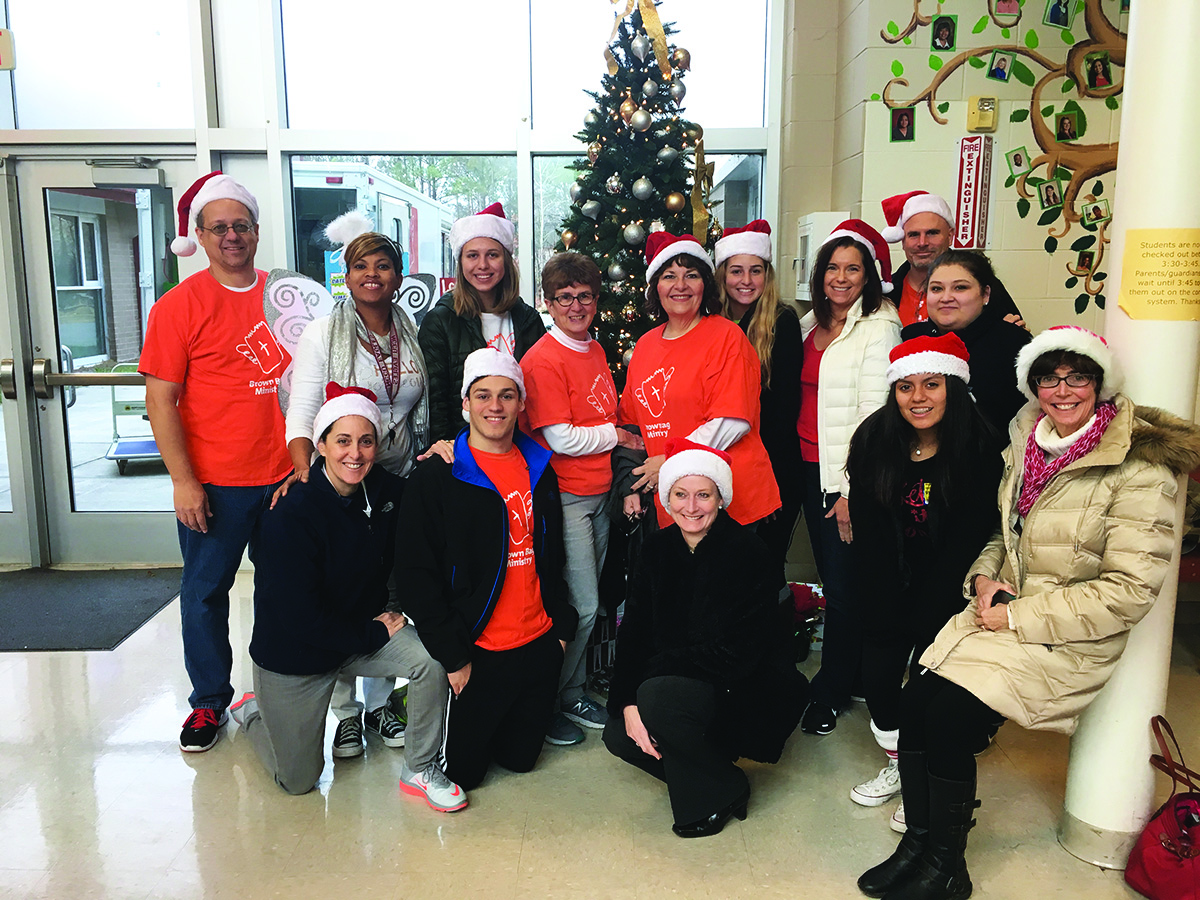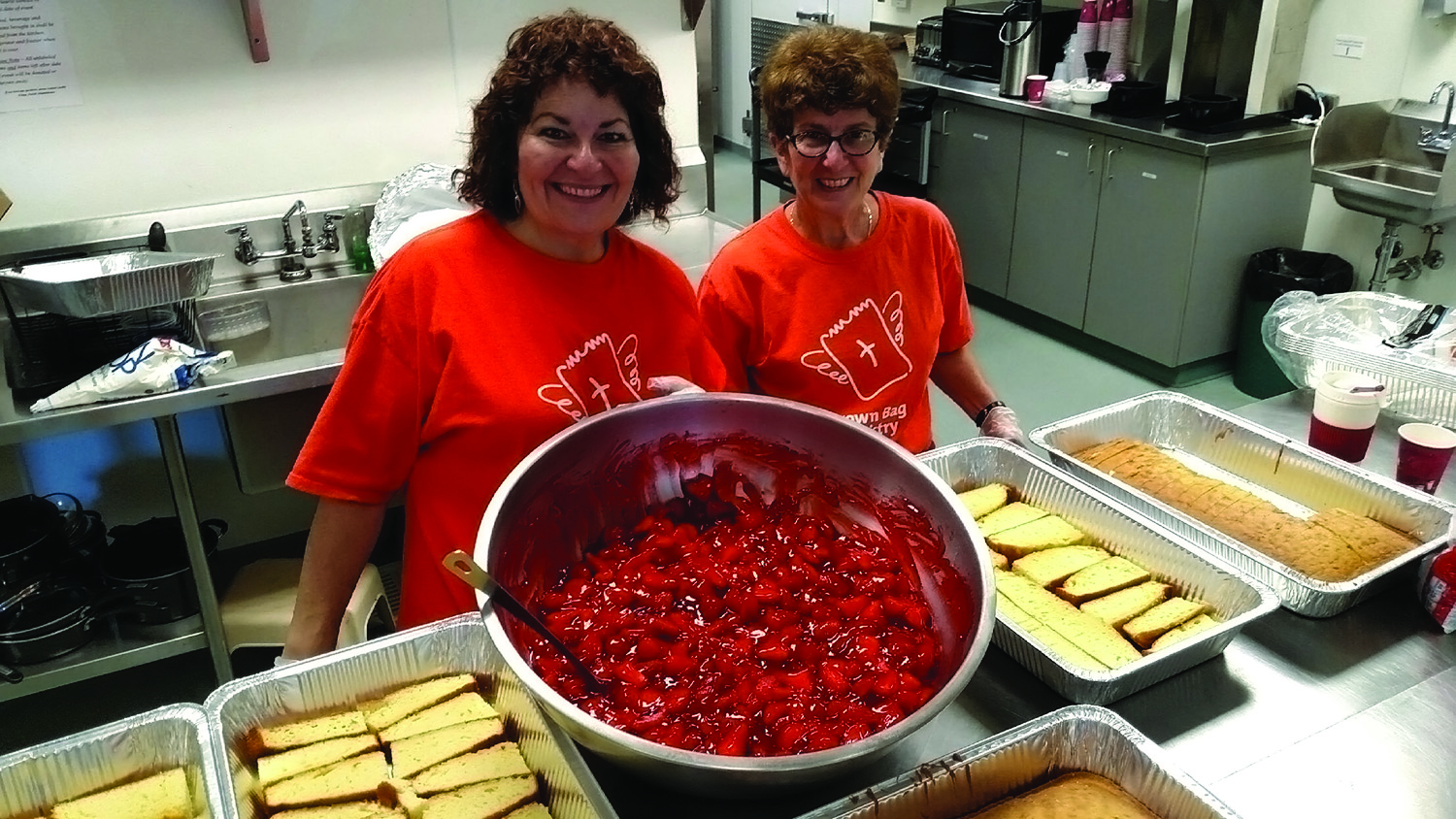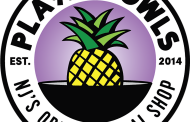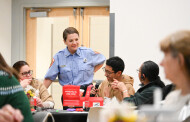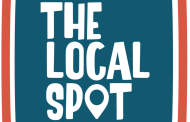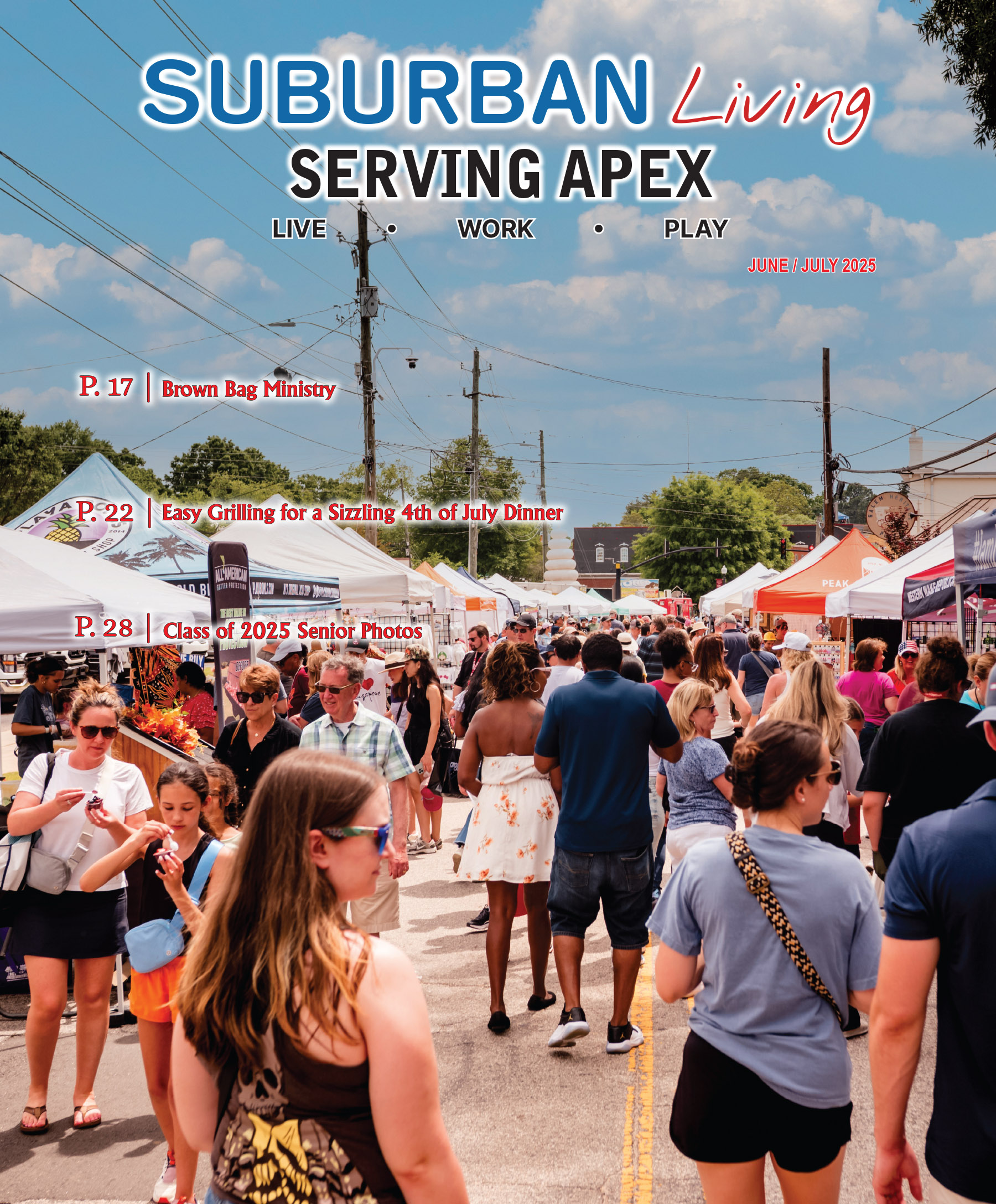It’s understandable if you hear “Brown Bag Ministry” and you think “lunch.” The name says it all. Or does it? In the case of the Brown Bag Ministry co-founded by Mary Jo (Bukowski) Close, a parishioner of St. Andrew the Apostle Catholic Church in Apex, the name reflects humble beginnings, but it doesn’t scratch the surface of what Brown Bag does today.
Every Saturday (with the exception of two) since 2005, Brown Bag has been feeding the hungry in Wake County and Durham County. Those first deliveries of about 25 lunch bags were put into the eager hands of homeless men and women in Moore Square in Raleigh. Today, in a well-orchestrated collaboration led by Apex resident David Legarth, 150 to 200 volunteers across five sites produce about 3,000 bag lunches on Saturday mornings, and two Saturdays a month they provide a homemade multi-course hot meal at the Oak City Outreach Center across the street from Moore Square. To say that Brown Bag has grown is an understatement.
Over One Million Brown Bag Lunches
On shopping day, Brown Bag volunteers pick up as many as 12 cases of bananas from Dennis Ennis Produce at the State Farmers Market, 500 loaves of bread from The Ship Outreach-Bread of Life, and an assortment of crunchy and sweet items from the Food Bank of Central & Eastern NC. Area grocery stores and discount warehouses provide sandwich bologna, cheese, water, and other foods to include in each bag.
On Saturday mornings, coordinators at St. Andrew in Apex, St. Catherine of Siena in Wake Forest, St. Eugene in Wendell, and St. Francis of Assisi and St. Philip Lutheran in North Raleigh set up their sites with tables, bagging and re-packaging stations, and even areas for the youngest volunteers to play or color when they tire of the assembly line.
Then, the volunteers arrive. Depending on the church location, volunteers might be individuals or families with young children, grandparents and senior center residents, honor society students, church groups, scout troops, Y-Guides, youth groups and young adult organizations, sports teams, school clubs, moms’ groups, men’s groups, college fraternities and sororities, even birthday party guests. People from all walks of life, people of specific faith-based denominations, and people who profess no affiliation with religion at all.
Legarth, now in his ninth year as the Brown Bag Ministry Chairman, describes the scene at St. Andrew’s as “controlled chaos.” But within an hour and fifteen minutes, anywhere from 30 to 130 volunteers have put together 1,300 or more bags, each containing a bologna and cheese sandwich, a piece of fruit, a granola bar, a package of cheese and crackers or some other salty snack, a bottle of water, and a dessert item.
By 11:30am, the lunches and other donations are loaded on the Brown Bag truck and driven to the Oak City Outreach Center. When the Brown Bag volunteers arrive for their 12:00pm to 1:00pm timeslot, they are regularly met by a line of hungry men, women, and children. Of the total number of bags made that morning, some will be handed out at the Oak City Outreach Center, and others to homeless camps and shelters, small downtown distribution groups, as well as low-income and subsidized housing complexes.
On the Saturdays when Brown Bag provides hot lunches at the Oak City Outreach Center, Josephine Lanier, Brown Bag’s volunteer chef, and others take over the church’s renovated commercial-grade kitchen. While bag lunches are being prepped in the hall, hot food to feed an additional 200 people is cooked and loaded into the truck. Many of the same volunteers that helped to make the bags and hot dishes will serve at the Oak City Outreach Center.
The last stop for the truck is the South Wilmington Street Center, Wake County’s main shelter for homeless men. There, the Brown Bag coordinator drops off bag lunches and the remaining hot food and fresh produce. By 2:00pm, the truck returns, empty, to the St. Andrew’s parking lot.
Since 2005, Brown Bag has served more than 58,000 hot meals. And in April 2017, they made their one millionth brown bag lunch. Already that number is at 1.2 million and rising. The cost to put together each bag is just thirty-five cents, but the value of the relationships that food represents is priceless. It is these relationships that have led to the expansion of Brown Bag’s mission.
Thinking ‘Outside the Bag’
“Everybody knows our brown bags; it’s our biggest publicized activity,” says Legarth. “We’re consistently there and people expect us and we’ve developed relationships with a lot of these individuals. But people may not know that we get asked for things, and when you humble yourself to ask us for a mattress, we’re going to find a mattress for you.”
In this vein, the Brown Bag volunteers often find themselves filling in where government agencies and other ministries fall short. To a homeless man with throat cancer, they give shake supplements, applesauce, and other soft foods he can swallow. To a woman in subsidized housing, they gave a queen-size bedroom set that Legarth happened upon through a personal contact. “She had been sleeping on the floor for three years. She was beyond words. That’s the kind of outreach we like to do and if it’s something we can do, we’re going to do it. Those connections make the ministry blossom.”
It’s also what Legarth calls “ministry creep.” It’s buying steel-toe boots at Walmart so someone can apply for a day-labor job. It’s getting bandages for someone with untreated sores. It’s giving a Lego set to a grandparent to give to a grandchild for Christmas. It’s providing someone with money every week so they can wash their clothes at a laundromat. “There isn’t a ministry where you can go for help getting your laundry done. It doesn’t exist.” Legarth admits, though, that “these are the activities that make the ministry special.”
A particular need Brown Bag tries to satisfy is for fresh produce as some areas of Raleigh are known as “food deserts,” where fruits and vegetables simply aren’t readily available.
T
hanks to a partnership with The Produce Box, Brown Bag supplements fresh items from the Food Bank with boxes of the same produce Apex subscribers receive on their doorstep every week. “When things are coming into season, we could have ten different items to offer, and a bushel of every item,” Legarth says. “It used to be that there were a couple people in line for a brown bag when we pulled up. Now, we can have 30 people in line for fresh produce.”
Targeted drives for specific populations are another call that Brown Bag has been answering in recent years. They collect high-need items and serve hot meals to veterans, migrant workers, and those in substance abuse recovery. They also provide educational outreach in the form of opportunities for corporations to foster team-building among their employees by preparing bag lunches outside of the Saturday schedule, and community events, such as UNC Chapel Hill’s Ramsgiving event before Thanksgiving, in which Brown Bag participates to raise awareness of hunger and homelessness.
Ideally, all of Wake County’s residents would have enough to eat and adequate shelter and there would be no need for the Brown Bag. Until that day, however, Brown Bag will continue doing as much as it can, with what it has.
One limitation is the Brown Bag truck. “Sometimes we have to skip picking up produce or other items because we don’t have the room. We’re hoping to add a refrigerated van or other transport so we wouldn’t have to limit the amount of fresh produce we take downtown. We can’t do [other forms of] outreach on Saturdays without renting a U-Haul truck because our truck is in use. Having an additional vehicle would open up more avenues for other activities we can do.”
Hand-to-Hand Donations
Throughout the year, organized groups are asked to sign up to volunteer on Saturdays at St. Andrews and to bring collection drive items. During the holidays, however, Brown Bag fills every bag with the help of walk-in families that come in droves to serve. As a result, there are very few drive items being collected at this time of year. Legarth wants to offer an alternative to groups who want to serve but cannot find a place to volunteer.
“We would love food drives. Or, if someone wants to collect hygiene items, or blankets, or coats, hats, and gloves, we would love those. If a group wants to collect packages of new men’s underwear, t-shirts, and socks, we would love that. Just let us know what you’re going to collect so we can plan how to distribute it.”
Christmas toy drives are also welcome. Legarth explains that often when larger charities have toy drives, the recipient families are already in their program. “A family can’t just walk up and get a box of toys.” These are the families who approach the Brown Bag and who benefit from the special collections.
Brown Bag Ministry has much to be proud of. They’re certainly more than just brown bag lunches and they put every donated item into the hands of someone who needs it. Legarth views Brown Bag as a conduit. “Someone has to be willing to go into the neighborhood, or downtown, or seek out that person. For me, that’s the best part. We tell volunteers that they’re going to get blessed many more times than they’re going to bless that person.”
As Legarth’s wife, Trish, points out, “Brown Bag provides the ability to volunteer at all ages and the ability to pitch in when you can. People run from charities because they’re afraid they’ll get swallowed up or they don’t want to sign up. Groups need to sign up, but a family can just show up. Brown Bag reaches and connects in ways that are far greater than just brown bag lunches.”
To learn more about the Brown Bag Ministry, visit their website at www.brownbagministry.org.
If you, your family, or another group wishes to organize a collection drive, contact David Legarth at BrownBagMinistry@yahoo.com

